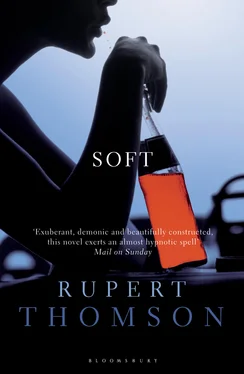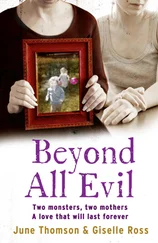Rupert Thomson - Soft
Здесь есть возможность читать онлайн «Rupert Thomson - Soft» весь текст электронной книги совершенно бесплатно (целиком полную версию без сокращений). В некоторых случаях можно слушать аудио, скачать через торрент в формате fb2 и присутствует краткое содержание. Год выпуска: 2012, Издательство: Bloomsbury Paperbacks, Жанр: Современная проза, на английском языке. Описание произведения, (предисловие) а так же отзывы посетителей доступны на портале библиотеки ЛибКат.
- Название:Soft
- Автор:
- Издательство:Bloomsbury Paperbacks
- Жанр:
- Год:2012
- ISBN:нет данных
- Рейтинг книги:3 / 5. Голосов: 1
-
Избранное:Добавить в избранное
- Отзывы:
-
Ваша оценка:
- 60
- 1
- 2
- 3
- 4
- 5
Soft: краткое содержание, описание и аннотация
Предлагаем к чтению аннотацию, описание, краткое содержание или предисловие (зависит от того, что написал сам автор книги «Soft»). Если вы не нашли необходимую информацию о книге — напишите в комментариях, мы постараемся отыскать её.
Soft — читать онлайн бесплатно полную книгу (весь текст) целиком
Ниже представлен текст книги, разбитый по страницам. Система сохранения места последней прочитанной страницы, позволяет с удобством читать онлайн бесплатно книгу «Soft», без необходимости каждый раз заново искать на чём Вы остановились. Поставьте закладку, и сможете в любой момент перейти на страницу, на которой закончили чтение.
Интервал:
Закладка:
She lifted the stiff iron catch. The gate groaned open. Then, as she set out across the field, she noticed that no lights were showing in the caravan. Her heart quickened. Perhaps he had already gone to bed. Perhaps he was out. She felt a disappointment seep into her. The sky seemed to widen suddenly, expand. She couldn’t imagine where he might be. She knew so little about the life he lived when she wasn’t there. How he passed the time. Who he saw, if anyone. She stood still, the caravan a pale rectangle against the darkness of the hedge. Her eyes drifted upwards to the last lit shreds of cloud, thin red shapes on a mauve ground. They reminded her of the Easter she had spent with him the year before. He had hidden chocolate eggs in the field for her — but he had hidden them too well. By the time she found them, they had been attacked by animals. Some had been devoured completely, so that nothing but a twist of wizened, glittery paper had been left behind.
She crossed the field, making for the caravan. She could hear her own breathing, fast and shallow, and she knew then that she was hurrying. In that moment she sensed that something had altered. When she turned the door-handle, she was not surprised to find it locked. She peered through the window: it looked the same as always — tidy but cluttered, the contents veiled with a subtle fuzz of dust. At least he hadn’t moved. Was it possible he was trying to call her from the phone-box? Would that be too much of a coincidence? Even now, she thought, he could be trudging back along the road, cursing the fact that he had walked three miles for nothing. Then his eyes would alight on her, sitting on the steps. As if, simply by dialling her number, he had somehow cast a line and reeled her in. She reached into her bag and, taking out a can of Kwench! opened it and drank. She shivered at the taste, but finished it. Then opened another.
The sky had faded, the trees had blackened. An hour must have passed. The darkness was beginning to play tricks on her. She saw the gate swing open more than once. She saw figures appear — not just her father, but Charlie, Betty from the restaurant, even Sally James. At last she stood up, walked slowly back across the field. But instead of following the track that led to the road, she turned into the farmyard. Sprigs of Queen Anne’s lace glowed dimly in the hedgerows. She passed silent sheds, the air rich with manure and hay. When she reached the house she hesitated. There was a window next to the back door. Shadows shifted behind the curtains. She had never spoken to Mr Babb, the farmer. She didn’t even know what he looked like. At least someone was in, though.
An old woman answered the door. She had poor eyesight and thinning hair.
‘I’m looking for my father,’ Glade said. ‘He lives in the caravan. Up there.’ She pointed towards the field.
The woman turned and called over her shoulder. ‘Harry?’
Glade heard the scrape of chair-legs on a tile floor. The door opened a foot wider and a man in his middle-fifties stood beside the woman, wiping his mouth on the back of his wrist. He had the swollen eyelids of someone who had just been woken out of a deep sleep.
‘You Spencer’s daughter?’ he said.
Glade nodded. ‘Yes.’
‘He’s at the hospital.’
Her throat hurt suddenly, as if she had been shouting. She felt somebody take her by the arm.
‘You’d better come in,’ the woman said.
She sat Glade at the kitchen table, poured tea into a yellow cup. While Mr Babb finished his supper of cold roast meat and boiled potatoes, she told Glade what she knew. It had happened late on Sunday night. She was walking over to the sheds when she noticed what looked like a piece of washing lying in the field. She thought it must have blown off the line. There had been strong winds out of the north that day. Only when she got up close did she realise that it was Mr Spencer from the caravan.
‘If he hadn’t been wearing that white shirt,’ she said, ‘I’d never have seen him.’
She fetched Mr Babb, who carried Mr Spencer into the house. From there, they called an ambulance. A heart attack, it was. Nothing too serious. Still, they were keeping him in hospital for a few days, just to be on the safe side.
‘No one told me,’ Glade said quietly.
‘They tried to ring you from the hospital,’ the woman said. ‘They couldn’t get an answer.’
Glade felt her face flush. She stared at her tea-cup, which was chipped around the rim. Perhaps it, too, had been gnawed by animals.
‘There was music playing,’ Mr Babb said suddenly.
The woman looked up. ‘Music?’
‘Don’t you remember? In the field.’
‘Flamenco,’ Glade said.
The farmer and the woman peered in her direction, as if a sudden mist had filled the room and hidden her.
‘Flamenco,’ Glade said. ‘It’s Spanish.’
That night she slept in the caravan. It was too dark to make out any of her father’s possessions, but the pillow smelled of him, a smell that was both dry and sweet, like custard powder. After finishing her tea, she had asked Mr Babb where the hospital was, imagining that she could visit that same evening. The old woman answered first, saying that the hospital was twenty-five miles away. Then Mr Babb shook his head. He thought it was more like thirty. And anyway, he said, visiting hours would already be over. Glade gazed into her empty cup. That sudden heat passed over her again and she felt as if the table was easing out from under her. She scanned the room, looking for something familiar or reliable. The old stone sink, the gun leaning in the corner, the mud-streaked fridge. Her eyes struggled briefly with the curtains and their repeating twists of grey and brown and yellow. Through the half-open door she could see into a dingy corridor, sacks of grain slumped on the floor, the walls and ceiling painted green.
Mr Babb opened the drawer at the end of the table, sliding it all the way out until the delicate brass handle buried itself in his belly. His fingers moved clumsily among the jumbled contents. At last he produced a ring of grey metal that held keys of every shape and size. He could unlock the caravan for her, he announced. Or if she was worried about sleeping out there all by herself, she was welcome to the spare room. Glade thanked him, saying she would be happy in the caravan. She would feel closer to her father. She hesitated, then asked if she could call the hospital. A meaningful look passed between the farmer and the woman, the air seemed tangled for a moment, then the farmer nodded slowly and rose to his feet. He opened the cupboard behind the kitchen door and took out a plastic bag with Tesco written on one side. Reaching into the bag, he brought out a shiny, pale-pink telephone, an old model with a dial on the front instead of buttons.
‘It’s so it doesn’t get dirty,’ the woman explained. ‘Mr Babb, he just hates dust. Don’t you?’ And she looked up at the farmer who had the phone in his left hand, gripping it from above, with fingers spread, as if it were a tortoise or a crab.
He didn’t answer her, but wheeled sideways and, stooping abruptly, plugged the lead into a socket in the wall. He placed the phone in front of Glade, his face still flushed from the exertion. The woman told her the number of the hospital and they both watched greedily as she dialled. She spoke to a nurse on her father’s ward. According to the nurse, he was already sleeping. He was comfortable. She could visit in the morning, between ten o’clock and twelve.
She lay in her father’s bed with the lights out and the curtains drawn. She could feel the darkness all around her like a weight, a presence. It seemed to exert a pressure on the walls, the caravan as fragile as an eggshell in the night’s clenched fist. Sleep would not take her. After an hour she had to light a candle, wedging it upright in an empty whisky bottle that she found beside the bed. What happened, Glade? What happened? Her father’s voice spoke to her from somewhere above, under the roof. She remembered how her mother had smashed a bowl once, bits of china skidding across the floor. And she had shouted too, words with blunt endings, then the kitchen door slammed shut. Her father stood with his head lowered as though his punishment was only just beginning. What happened? She tried to hypnotise herself by staring at the flame. A strong wind swooped down, shook the walls. The world turned to water, hedge and trees and grass hissing like breakers on a pebble beach. Out in the field the journalist stood watch, his face earnest, conscientious, his notebook a white glimmer in his hand. He was wearing the brown suit again, with the yellow cardigan underneath, and in his breast pocket she could see a triangle of folded handkerchief, which was a subtle reference to the mountain, of course, his way of telling her that he was on her side. And suddenly she knew the truth. Charlie was wrong to worry. The journalist would come for her. Maybe not tonight. But he would come. She would talk to him, and he would listen. Everything would be explained. And with that thought the wind rose again, hiding all other sounds, and her breathing deepened and she slept.
Читать дальшеИнтервал:
Закладка:
Похожие книги на «Soft»
Представляем Вашему вниманию похожие книги на «Soft» списком для выбора. Мы отобрали схожую по названию и смыслу литературу в надежде предоставить читателям больше вариантов отыскать новые, интересные, ещё непрочитанные произведения.
Обсуждение, отзывы о книге «Soft» и просто собственные мнения читателей. Оставьте ваши комментарии, напишите, что Вы думаете о произведении, его смысле или главных героях. Укажите что конкретно понравилось, а что нет, и почему Вы так считаете.












